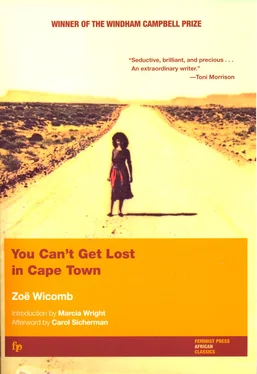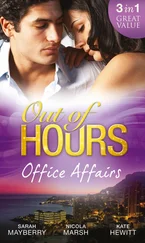‘Why are the booze shops called hotels? Who stays in them? Surely there’s no call for hotels in a Coloured area?’
‘Search me, as we used to say. Nobody stays in them, I’m sure. I imagine they need euphemisms when they know that they grow rich out of other people’s misery. Cheap wine means everyone can drown his sorrows at the weekends, and people say that men go into teaching so that they have the afternoons to drink in as well. I swear the only sober man to be found on a Saturday afternoon is the liquor boss. The rest are dronkies, whether they loaf about on street corners in hanggat trousers or whether they slouch in upholstered chairs in front of television sets. And we all know a man of position is not a man unless he can guzzle a bottle or two of spirits. It’s not surprising that the Soweto kids of ’76 stormed the liquor stores and the shebeens. Not that I’d like to compare the shebeen queen making a miserable cent with the Coloured “elite” as they call themselves who build big houses and drive Mercedes and send their daughters to Europe to find husbands. And those who allow themselves to be bought by the government to sit in Parliament. ’
She holds her head. ‘Jesus, I don’t know. Sometimes I’m optimistic and then it’s worth fighting, but other times, here in this house, everything seems pointless. Actually that wine’s given me a headache.’
I stare into the dirty plate so hard that surely my eyes will drop out and stare back at me. Like two fried eggs, sunnyside-up. Then I take her hand.
‘Listen, I know a trick that takes headaches away instantly.’ And I squeeze with my thumb and index finger deep into the webbed V formed by the thumb of her outstretched hand. ‘See? Give me the other hand. See how it lifts?’ Like a child she stares in wonderment at the hand still resting in mine.
The back door bursts open and Tillie rushes in balancing on her palm a curious object, a priapic confection.
‘Look,’ she shouts, ‘look, isn’t it lovely? It’s the stale loaf I put out for the birds and they’ve pecked it really pretty.’
The perfectly shaped phallus with the crust as pedestal has been sculpted by a bird’s beak. Delicately pecked so that the surface is as smooth as white bread cut with a finely serrated knife. We stare wanly at the child and her find, then we laugh. Tears run down Moira’s face as she laughs. When she recovers her voice is stern. ‘What are you doing outside at this hour? Don’t you know it’s ten o’clock? Where’s Carol?’
Carol bursts in shouting, ‘Do you know what? There are two African men in the playhouse, in our playhouse, and they’ve got our sleeping bags. Two grown-ups can’t sleep in there! And I went to tell Susie but she won’t open the door. She spoke to me through the window and she said it’s time to go to bed. But there’s other people in her room. I heard them. And Susie shouldn’t give people my sleeping bag.’
Moira waves her arm at Carol throughout this excited account, her finger across her lips in an attempt to quieten the child.
‘Ssht, ssht, for God’s sake, ssht,’ she hisses. ‘Now you are not to prowl around outside at night and you are not to interfere in Susie’s affairs. You know people have problems with passes and it’s silly to talk about such things. Daddy’ll be very cross if he knew that you’re still up and messing about outside. I suggest you say nothing to him, nothing at all, and creep to bed as quietly as you can.’
She takes the children by the hands and leads them out of the room. Moments later she returns to carry off the little one sleeping on the bench. I start to clear the table and when she joins me she smiles.
‘Aren’t children dreadful? They can’t be trusted an inch. I clean forgot about them, and they’ll do anything not to go to bed. When adults long to get to bed at a reasonable hour which is always earlier than we can manage. Of course sleep really becomes a precious commodity when you have children. Broken nights and all that. No,’ she laughs, looking me straight in the eye, ‘I can’t see you ever coping with children.’
The dishes are done. There is a semblance of order which clearly pleases Moira. She looks around the kitchen appreciatively then yawns. ‘We must go to bed. Go ahead, use the bathroom first. I’ll get the windows and doors shut. Sleep well.’
I have one of the children’s bedrooms. For a while I sit on the floor; the little painted chair will not accommodate me, grotesque in the Lilliputian world of the child. Gingerly I lay my clothes across the chair. It is not especially hot, but I open the window. For a while. I lie in my nightdress on the chaste little bed and try to read. The words dance and my eyes sting under heavy lids. But I wait. I stretch my eyes wide open and follow a mad moth circling the rabbit-shaped lamp by the side of the bed. I start to the mesmerising scent of crushed gardenia when the book slips and slips from under my fingers. In this diminutive world it does not fall with a thud. But I am awake once more. I wait.
You’ve always loved your father better.
That will be her opening line.
The chair she sits in is a curious affair, crude like a crate with armrests. A crate for a large tough-skinned vegetable like hubbard squash which is of course not soft as its name suggests.
I move towards her to adjust the goatskin karos around her shoulders. It has slipped in her attempt to rise out of the chair. I brace myself against the roar of distaste but no, perhaps her chest is too tight to give the words their necessary weight. No, she would rather remove herself from my viperous presence. But the chair is too low and the gnarled hands spread out on the armrests cannot provide enough leverage for the body to rise with dignity. (‘She doesn’t want to see you,’ Aunt Cissie said, biting her lip.)
Her own words are a synchronic feat of syllables and exhalations to produce a halting hiss. ‘Take it away. I’ll suffocate with heat. You’ve tried to kill me enough times.’ I drop the goatskin on to the ground before realising that it goes on the back of the chair.
I have never thought it unreasonable that she should not want to see me. It is my insistence which is unreasonable. But why, if she is hot, does she sit here in the last of the sun? Her chair stands a good twenty yards from the house, beyond the semi-circle of the grass broom’s vigorous expressionistic strokes. From where I stand, having made the predicted entrance through the back gate, she is a painterly arrangement alone on the plain. Her house is on the very edge of the location. Behind her the Matsikamma Range is interrupted by two swollen peaks so that her head rests in the cleavage.
Her chair is uncomfortable without the karos. The wood must cut into the small of her back and she is forced to lean forward, to wriggle. Our eyes meet for a second, accidentally, but she shuts hers instantly so that I hold in my vision the eyes of decades ago. Then they flashed coal-black, the surrounding skin taut across the high cheekbones. Narrow, narrow slits which she forced wide open and like a startled rabbit stared entranced into a mirror as she pushed a wave into the oiled black hair.
‘If only,’ she lamented, ‘if only my eyes were wider I would be quite nice, really nice,’ and with a snigger, ‘a princess.’
Then she turned on me. ‘Poor child. What can a girl do without good looks? Who’ll marry you? We’ll have to put a peg on your nose.’
And the pearled half moon of her brown fingertip flashed as she stroked appreciatively the curious high bridge of her own nose. Those were the days of the monthly hairwash in the old house. The kitchen humming with pots of water nudging each other on the stove, and afterwards the terrible torments of the comb as she hacked with explorer’s determination the path through the tangled undergrowth, set on the discovery of silken tresses. Her own sleek black waves dried admirably, falling into place. Mother.
Читать дальше












